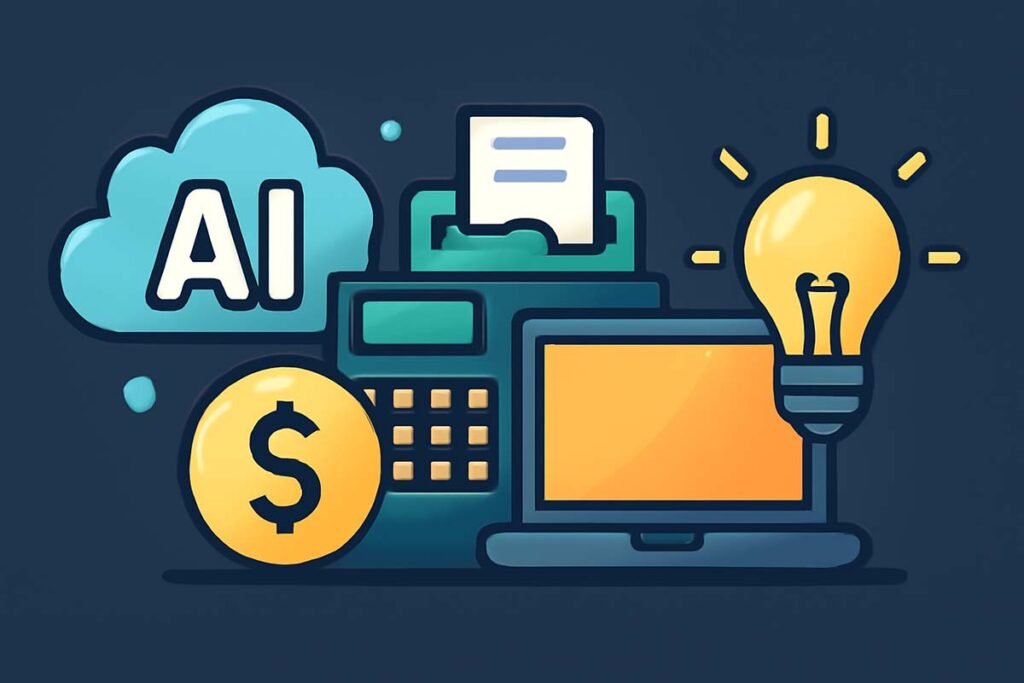In 2025, Artificial Intelligence (AI) is no longer just for large corporations with million-dollar budgets — it’s now a powerful, affordable tool for small businesses as well. Whether you run a retail store, a café, an online shop, or a freelancing agency, AI can help you save time, cut operational costs, reach more customers, and make smarter business decisions.
In this post, we’ll look at the top 10 AI tools every small business should consider in 2025, their features, use cases, pricing, and how they can give you a serious edge over competitors.
1. Jasper AI — Best for High-Quality Marketing Copy
Use Case: Creating ad copy, blog posts, product descriptions, and email newsletters.
Key Features:
- dozens of ready-made formats for ads, blogs, and social posts..
- Ability to set your brand voice and tone.
- Multilingual support for global reach.
Pricing: Starts at $49/month.
Why It’s Great: Writing high-converting sales copy takes time, and hiring a professional copywriter can be expensive. Jasper speeds up the process while still producing engaging, human-like content.
Example: A small boutique clothing store can use Jasper to create seasonal sale ads in minutes, instead of spending hours writing them manually.
2. ChatGPT (OpenAI) — Best for Conversations & Ideas
Use Case: Customer support, brainstorming, coding assistance, creating FAQs.
Key Features:
- Advanced natural language understanding.
- Integration via API to power chat widgets or customer service bots.
- Can summarize, translate, and draft emails instantly.
Pricing: Free tier; ChatGPT Plus at $20/month.
Why It’s Great: Small business owners can use it for content brainstorming, automated support, and even creating quick video or blog scripts.
Example: A local travel agency can use ChatGPT to auto-generate responses to common inquiries such as tour prices or itinerary suggestions.
3. Canva AI — Best for Marketing Designs
Use Case: Designing social media graphics, business cards, brochures, product packaging.
Key Features:
- Magic Write: AI-assisted text generation for marketing copies.
- Design suggestions based on content type.
- Massive library of templates and royalty-free stock.
Pricing: Free plan available; Pro from $12.99/month.
Why It’s Great: You don’t need a graphic design background to create stunning visuals for your brand.
Example: A small bakery can design an Instagram carousel for a new cake launch in under 20 minutes.
4. Notion AI — Best for Productivity & Organization
Use Case: Task management, note-taking, project tracking, and content planning.
Key Features:
- AI-generated summaries for meetings or reports.
- Task boards, databases, and collaborative workspaces.
- Templates for business planning, CRM, and content calendars.
Pricing: Free tier; from $8/month for advanced features.
Why It’s Great: Keeps all your business data in one place, reducing time wasted searching across different tools.
Example: A freelance marketing consultant can manage all client projects in Notion while using the AI assistant to summarize emails and meeting notes.
5. Grammarly — Best for Professional Communication
Use Case: Polishing website content, proposals, and emails.
Key Features:
- Corrects grammar, punctuation, and spelling errors.
- Tone and clarity suggestions for better engagement.
- Plagiarism checker for original content.
Pricing: Free plan; Premium at $12/month.
Why It’s Great: Clear, error-free writing builds trust with customers and partners.
Example: An e-commerce business can ensure all product descriptions sound professional and error-free.
6. Pictory AI — Best for Video Marketing
Use Case: Converting blog posts, scripts, or text into short marketing videos.
Key Features:
- Text-to-video creation in minutes.
- Auto-captioning for accessibility.
- Stock footage library.
Pricing: From $19/month.
Why It’s Great: Videos boost engagement and sales on platforms like Instagram and TikTok.
Example: A fitness coach can turn a workout blog into a short video for social media promotion.
7. Tidio — Best for Automated Customer Support
Use Case: 24/7 chatbot support, lead capture, and live chat.
Key Features:
- AI-powered responses to FAQs.
- Integration with Shopify, WordPress, and other platforms.
- Multilingual support for global reach.
Pricing: Free plan available; Premium from $19/month.
Why It’s Great: Helps small teams maintain quick customer service without hiring additional staff.
Example: An online electronics shop can answer “Where’s my order?” automatically, reducing workload.
8. Surfer SEO — Best for Boosting Google Rankings
Use Case: Optimizing web content for higher Google visibility.
Key Features:
- Keyword analysis and competitive insights.
- On-page content optimization suggestions.
- Content audits to improve old posts.
Pricing: From $59/month.
Why It’s Great: Ranking higher in search results means more organic traffic and more sales.
Example: A real estate agent’s blog can attract more home buyers by optimizing neighborhood guides with Surfer SEO.
9. Zapier — Best for Workflow Automation
Use Case: Automating repetitive admin tasks by connecting different apps.
Key Features:
- 5,000+ app integrations (like Gmail, Slack, Trello, Shopify).
- No coding required.
- Multi-step workflows (Zaps).
Pricing: Free tier; Premium from $19.99/month.
Why It’s Great: Reduces manual work, letting business owners focus on growth.
Example: Automatically send new Shopify customer data to a Mailchimp email list.
10. Vidyo AI — Best for Repurposing Video Content
Use Case: Creating short, engaging video clips from long recordings.
Key Features:
- AI trimming to identify key highlights.
- Automatic captions for accessibility.
- Optimized formats for TikTok, Instagram, and YouTube Shorts.
Pricing: From $29/month.
Why It’s Great: Repurposes webinars or podcasts into multiple shareable clips for social media.
Example: A business coach can convert a 1-hour workshop video into 10 short TikTok videos.
How to Choose the Right AI Tools for Your Business
Not every AI tool will suit every business — select based on:
- Business Goals: Are you looking to save time, improve marketing, or automate support?
- Budget: Start small, invest in 1–2 tools, and expand as you see results.
- Ease of Use: Choose tools your team can learn quickly.
- Integration: Pick software that works well with tools you’re already using.
AI is no longer optional — it’s a must-have for small businesses that want to grow faster in 2025. From content creation to customer support, automation, and marketing, AI tools are making it easier and cheaper than ever to run a professional, efficient business.
💡 Next Step: Try 1–2 tools from this list for 30 days. Track how much time you save, the quality of results, and any boost in sales. Over time, these tools will likely pay for themselves many times over.




Pingback: How to Start a Career in Artificial Intelligence – Step-by-Step Guide (2025) - firstspost.com
Pingback: AI in Everyday Life – 15 Real Examples You’re Already Using (2025) - firstspost.com
Pingback: Beginner’s Guide to Prompt Engineering – Mastering AI Communication in 2025 - firstspost.com
Pingback: Beginner’s Guide to Artificial Intelligence: What It Is, How It Works, and Why It Matters in 2025 - firstspost.com
Pingback: Best AI Chrome Extensions to Boost Productivity in 2025 - firstspost.com
Pingback: How AI is Changing Marketing – Trends & Examples (2025) - firstspost.com
Pingback: AI-Powered Productivity Tools for Remote Workers & Freelancers in 2025 - FirstsPost